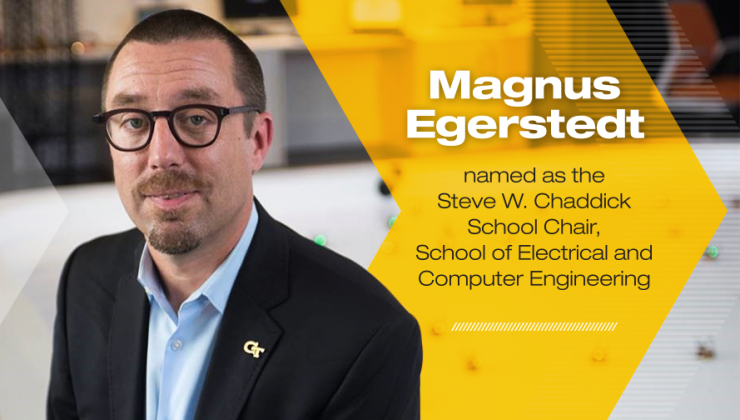Magnus Egerstedt Named School Chair for Georgia Tech’s School of Electrical and Computer Engineering
May 04, 2018 — Atlanta, GA

Magnus Egerstedt Named New Chair of ECE
Dr. Magnus Egerstedt has been appointed as the new Steve W. Chaddick School Chair of the School of Electrical and Computer Engineering (ECE) in the College of Engineering at the Georgia Institute of Technology, effective August 1. Egerstedt is currently the executive director for Georgia Tech’s Institute for Robotics and Intelligent Machines. He also holds the Julian T. Hightower Chair in Systems and Controls in ECE, along with courtesy appointments in the School of Interactive Computing, Woodruff School of Mechanical Engineering and Guggenheim School of Aerospace Engineering.
“Magnus is a distinguished investigator, world-class expert in his field and a respected mentor,” said Steve McLaughlin, dean of the College of Engineering and Southern Company chair. “His unique combination of administrative and academic experience has prepared him well to transition to an academic leadership role. An award-winning teacher and researcher, Magnus has also been at the forefront of our online classes in robotics. His unique perspective in the delivery of coursework will certainly serve him well in his role as chair in meeting the needs of our future students.”
Egerstedt succeeds McLaughlin, who became dean of the College of Engineering at Georgia Tech in September 2017. Dr. Raheem Beyah has been serving as interim chair for the School.
As the new chair, Egerstedt will oversee a School that is consistently ranked as one of the nation's most prominent programs of its kind in both graduate and undergraduate education. The School is one of the largest producers of electrical and computer engineers in the United States, with more than 2,500 undergraduate and graduate students and 110 faculty members. In FY 2017, ECE faculty members acquired an impressive $53,500,000 in research grants and contracts from government and industrial sources.
“I am honored and excited to have been selected as the next Steve W. Chaddick School Chair in ECE at Georgia Tech, which has been my home for more than 15 years,” Egerstedt said. “In today’s rapidly evolving innovation landscape, ECE finds itself at the forefront of a number of societal-level challenges that can only be met through multidisciplinary collaboration. Our combination of size, diversity and quality uniquely positions us to address these challenges and lead the charge in defining what a modern Electrical and Computer Engineering program could look like. I look forward to continuing to build on our world-class program and help write the next chapter in this amazing School’s story together with our outstanding faculty, students, staff and alumni."
Egerstedt earned his Ph.D. in applied mathematics from KTH Royal Institute of Technology in Stockholm, Sweden. He joined Georgia Tech’s School of Electrical and Computer Engineering in 2001 after completing a postdoctoral appointment at Harvard University. Egerstedt is a Fellow of the IEEE and he received the John R. Ragazzini Education Award from the American Automatic Control Council; the Alumnus of the Year Award from the Royal Institute of Technology; and the W. Marshall Leach, Jr./Eta Kappa Nu Outstanding Teacher Award.
Egerstedt’s research group works in the general areas of control theory and robotics. During the last decade, his research has focused on control and coordination of complex networks, such as swarms of mobile robots. His research has produced more than 350 peer-reviewed publications and resulted in more than $8 million in sponsored research. Egerstedt has graduated over 30 Ph.D. students, and his massive open online course (MOOC) “Control of Mobile Robots,” has enrolled more than 150,000 students worldwide.
The College of Engineering at Georgia Tech is the largest of its kind in the country with more than 12,000 undergraduate and graduate students enrolled. The college ranks in the top five in undergraduate and graduate engineering education by U.S. News and World Report.
The School of Electrical and Computer Engineering (ECE) is one of the top-ranked schools in the nation. ECE’s first-class education and research programs offer a multitude of customizable options: flexible pathways with 11 technical interest areas, 300-plus student organizations, more than 80 study abroad programs, and 19 Georgia Tech research centers. In addition to the main campus in Atlanta, Georgia, ECE also has permanent operations at Georgia Tech-Lorraine in France and Georgia Tech-Shenzhen in China.
Kay Kinard
kay.kinard@coe.gatech.edu




